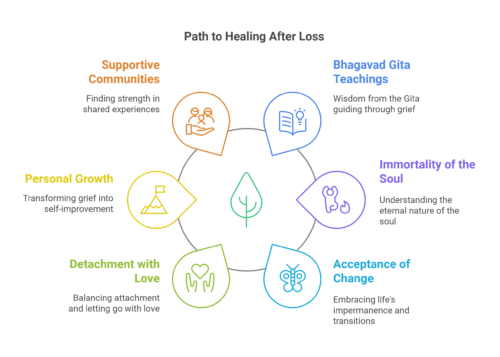The loss of a beloved one is one of life’s most profound and transformative experiences. It is a universal truth, yet its impact feels deeply personal and isolating. This grief shakes the very foundation of our existence, forcing us to confront the impermanence of life and the meaning of human connections. While the pain of such loss is inevitable, ancient wisdom, particularly from the Bhagavad Gita, provides a guiding light to navigate through this darkness.
The Emotional Weight of Loss and Helplessness
When we lose someone we love, it’s not just their absence that we mourn but also the unfulfilled dreams, shared moments, and their unique essence that once enriched our lives. This sense of helplessness can feel overwhelming, as death reminds us of life’s ultimate truth—our inability to control its final moments. The Bhagavad Gita addresses this helplessness by emphasizing the natural cycle of life and death. By understanding this eternal truth, we can begin to accept our vulnerabilities and find solace in the grand design of existence.
The Bhagavad Gita’s Perspective on Grief and Healing
The Bhagavad Gita offers timeless teachings that help us navigate loss with wisdom and resilience. Its verses provide insights into the eternal nature of the soul, the inevitability of change, and the importance of fulfilling one’s duties even in the face of sorrow.
The Immortality of the Soul
Krishna’s assurance to Arjuna is a cornerstone of solace:
“For the soul, there is neither birth nor death. It is eternal, indestructible, and timeless.”
This profound truth teaches us that while the physical form of our loved ones may depart, their essence—their soul—remains eternal. This understanding can bring comfort, reminding us that death is not the end but a transition.
Acceptance of the Inevitable
Krishna says, “That which is born will die, and that which dies will be born again.”
This wisdom urges us to embrace the transient nature of life rather than resist it. While the pain of separation is real, accepting life’s impermanence allows us to move forward without being consumed by despair.
Detachment with Love
The Gita advises, “Be steadfast in performing your duty, abandoning attachment and remaining even-minded in success and failure.”
This principle reminds us that detachment is not about indifference but about letting go of the pain and regret that bind us. It enables us to honor our loved ones without being trapped by sorrow.

Finding Meaning Amid Loss
The journey of grief, while painful, also holds the potential for growth and transformation. Viktor Frankl, in his seminal work Man’s Search for Meaning, suggests that even the deepest suffering can hold purpose. Similarly, the Bhagavad Gita teaches us to channel our grief into meaningful actions, ensuring that the memory of our loved ones becomes a source of inspiration rather than despair.
- Honoring Their Legacy: Engage in acts that celebrate the values and passions of your loved ones, such as starting a charitable cause or pursuing their unfulfilled dreams.
- Living Their Lessons: Reflect on their life and incorporate their teachings into your actions, keeping their essence alive through your behavior.
- Personal Growth: Let grief be a catalyst for self-improvement, pushing you to become a better version of yourself.
Balancing Emotion and Action in Modern Life
Modern life often demands quick recovery from grief, undermining the depth of the emotional process. The Bhagavad Gita teaches us the importance of balancing introspection with action, reminding us that healing is not about forgetting but about integrating loss into a renewed purpose for living.
- Embrace Acceptance: Recognize that life’s only certainty is change. By making peace with this truth, we can find clarity and resilience.
- Cherish Present Moments: Loss teaches us the value of the present. Strengthen relationships, express love, and resolve conflicts to ensure that every moment counts.
- Create Supportive Communities: Share your grief with empathetic individuals. A community that acknowledges and validates your emotions can lighten the burden of sorrow.
A Philosophical Path to Healing
The Bhagavad Gita’s teachings transcend religious boundaries, offering a philosophical framework for navigating grief. It encourages us to:
- Seek Inner Peace: Meditation and mindfulness can help calm the mind and connect with the eternal truths of existence.
- Focus on the Soul’s Journey: Accept that while physical life ends, the soul’s journey continues, providing comfort in moments of despair.
- Transform Pain into Wisdom: Use your experiences to develop compassion and understanding, contributing to a more empathetic world.
Conclusion: Turning Grief into Strength and Purpose
Grieving the loss of a beloved one is a deeply transformative process. The Bhagavad Gita reminds us that while the pain of separation is inevitable, it is also an opportunity to grow, find meaning, and honor the lives of those we love. By embracing the impermanence of life, we can learn to cherish every moment and build a legacy that reflects the love and lessons imparted by our departed ones.
Let their memory guide us toward living with greater compassion, resilience, and purpose. As Krishna taught Arjuna on the battlefield, even in the face of overwhelming sorrow, there is always a path forward—one that honors the soul’s eternal journey and transforms pain into strength.
Stay connected with us at www.theknowledgenexus.in for more profound insights, timeless wisdom, and practical lessons
Disclaimer:
The content on this website is intended for informational purposes only, offering insights derived from the Mahabharata, Ramayana, and Bhagavad Gita. Interpretations may vary as these are deeply subjective matters and may be viewed differently across cultures and perspectives.




